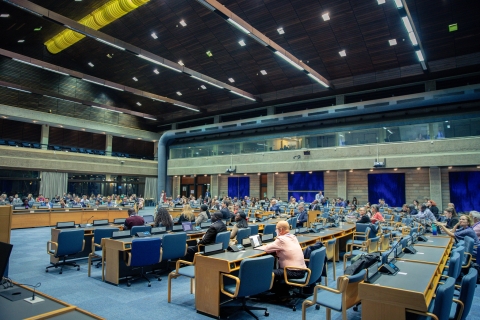
A UN conference aimed at creating an International Legally Binding Instrument for plastic waste reduction was hampered by divergent views on how to reach the destination. The following article was published in the January-February 2024 issue of NewsNotes.
The Third Session of the Intergovernmental Negotiating Committee (INC-3) on Plastic Pollution that met in Nairobi, Kenya, in November was unable to come to a consensus on a plan of action to drastically reduce and eliminate plastic waste in the environment.
With over 10 billion tons of plastic produced since the 1950s, studies show that over 8 billion tons are now waste, with between 10-15 million tons of plastic leaking into the marine environment each year. This number is expected to more than triple by 2050.
Studies have linked unsustainable production and subsequent consumption patterns to exponential growth in plastic pollution, which impacts human health as well as the health of terrestrial and marine ecosystems. In 2022, there were reports of plastic particles found in human lungs and in human blood; and a 2021 report found microplastics in human placenta.
In March 2022, the world took the historic decision to end plastic pollution by adopting UN Environment Assembly (UNEA) resolution 5/14, which established an Intergovernmental Negotiating Committee (INC) to develop an international legally binding instrument (ILBI) on plastic pollution, including in the marine environment, which could include both binding and voluntary approaches, based on a comprehensive approach that addresses the full lifecycle of plastics.
During the conference in Kenya, the varying interpretations of the resolution came to the fore as delegates shared their views on the “full life cycle of plastic,” with some favoring measures addressing plastic production, and others favoring downstream measures to eliminate plastic waste. Others focused on how best to ensure lasting design standards for plastic products.
The essential difference is whether the best solution is to eliminate production of plastic products completely or to seek means to recycle and reuse plastics after they have entered the waste stream. The group Beyond Plastics (www.beyondplastics.org) states bluntly that recycling is not the answer. They contend it was a ruse developed by plastic companies that put different numbered diagrams on types of plastic products but in fact most plastic waste cannot be recycled.
Graham Forbes of Greenpeace was quoted in the Boston Globe as saying: “The science is very clear, the data is very clear, and the moral imperative is very clear. You cannot solve the plastic pollution crisis if you do not massively cut plastic production.”
In the closing hours of the meeting, delegates were able to agree on some revisions to their mandate, however disagreements on how to eliminate production of single-use plastics will need to be addressed at their next conference to be held in April 2024 in Ottawa.
Some countries wanted a phase-out in a specific time period while others wanted a more open timeline using nationally determined actions. The Gulf Cooperation Council, representing oil producing nations along the Persian Gulf, wanted plastic polymers to be excluded and others wanted to focus only on downstream issues, i.e. recycling of plastic waste.
To achieve the goal of adopting the international legally binding instrument on plastic pollution by the end of 2024, the envisioned five meetings may not be enough. It was hoped that intersessional work prior to the fourth conference in 2024 would bridge the divergent positions but in fact INC-3 closed without any decision on intersessional work.
So far, the conferences have illustrated two distinct sets of preferences from delegations: those who want to limit the binding instrument and those who want to add ambition. There are two important topics shaping ambition. One relates to defining the lifecycle of plastics, and if measures will begin far upstream, midstream, or downstream. The second relates to the type of obligations the treaty will have.
At this point there is no clarity on what the final outcome will be because the subject of plastics extends from fossil fuel extraction, through product design, consumption, and into transboundary waste management. Other factors that need to be discussed include finance for developing countries, the building of necessary professional and institutional capacities, and facilitating access and transfer to relevant technologies.
No one expected negotiating a plastics treaty to be an easy task. The next session will have a new Chair presiding over the Committee, who has to deal with many challenges. Incoming Chair Luis Vayas Valdivieso, Ambassador of Ecuador, shared a quote after his election, calling on participants to “never lose hope when working with environmental issues.”
Faith in action
Sign EarthDay.org’s petition to the UN https://mogc.info/GlobalPlasticsTreaty
Images from the INC3 meeting of Observers in Conversation with the INC chair and ED Inger Andersen by UNEP/Ahmed Nayim Yussuf via Flickr.
